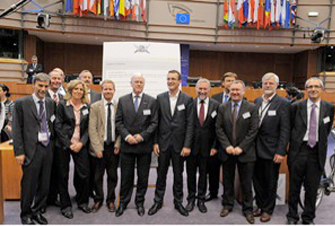The Charter of Brussels, signed by over 60 cities in Europe, is the primary ECF policy document. It calls upon policy-makers to promote cycling and to set clear, measurable targets for cycling in terms of both modal share (the percentage of trips made by bicycle out of the total number of trips) and road safety.
The Charter of Brussels came about at the Velo-city conference in Brussels in May 2009. The idea behind was to give local authorities a chance and a tool to commit to practical and realistic targets which would have a positive impact on cycling. It is a tool to be enacted at the city level. Among the key demands are a 15% bicycle modal share by 2020 and reducing bicycle road fatalities by 50%.
Towns and cities can sign up for the Charter of Brussels. By doing so, they commit themselves to invest in bicycle policy as an integrated part of urban mobility. At the same time, the Charter is a call on the European Union to promote urban cycling.
The Charter was launched on the occasion of the Velo-city 2009 conference in Brussels. The 15th of May 2009 ceremony was hosted by the European Parliament, with high-level representatives from the European Commission (Vice-President Siim Kallas) and the cities of Helmond (Brabantstad, Netherlands), Seville (Spain), Copenhagen (Denmark), Brussels (Belgium), Reggio Emilia (Italy), Varna (Bulgaria), Tartu (Estonia), Budapest (Hungary) and Munich (Germany) being the first signatories of the Charter. Up to date, more than 60 cities have signed the Charter. Moreover, the European Economic and Social Committee has been actively supporting it.
Download the Charter of Brussels here: Charter of Brussels

Does your city want to sign the Charter?
Signing is easy: send an email to ECF Policy Officer, Fabian Küster with the document signed by the City Mayor or a written proof that the City Council has voted in favour of its adoption.
Map of Charter of Brussels Signatories
View Charter of Brussels Signatories in a large map
Text of the Charter
CHARTER OF BRUSSELS
Cycling contributes to:
Liveable cities, efficient urban transport, less congestion, less traffic noise, healthy physical activity, road safety, clean air, fighting climate change, saving fossil fuels and sustainable tourism.
On the occasion of the Velo-city® 2009 conference in Brussels
Undersigned cities commit themselves:
- To set a target of at least 15% for the share of cycling in the modal split of trips for the year 2020 and of further growth if this target already is achieved
- To set a target of – 50% for cyclists running the risk of having a fatal accident for the year 2020
- To work on a bicycle parking and ‘anti bicycle theft policy’
- To participate in and to set up projects to increase cycling to school and to work
- To contribute to more sustainable tourism by investing in measures to improve and to increase bicycle tourism
- To cooperate closely with the bicycle user organisations, the bicycle retailers organization and the bicycle industry organizations and other stakeholders as the police, consultants and expertise centers, architects and builders of infrastructure to achieve the targets, and call upon all other European cities to follow our example.
This city, together with all the other cities signing this charter, call upon the European Commission and the European Parliament:
- To set a target of at least 15% for the share of cycling in the modal split of trips in Europe for the year 2020
- To establish the post of European Bicycle Officer in the administration of the European Commission
- To create a parliamentary intergroup ‘Cycling’ in the European Parliament
- To put adequate budgets at the disposal of European programs for the financial support of cities and NGOs promoting cycling in Europe.
Furthermore, the signers of this charter call upon all authorities worldwide, at all levels to strongly promote cycling and to incorporate cycling into all areas of policy (health, spatial planning, city management, economy, mobility and traffic, leisure, sports, tourism).
Here is the list of cities that have signed the Charter to date
| Austria | Graz, Linz |
| Belgium | Brussels, Ghent |
| Bulgaria | Varna |
| Denmark | Aalborg, Copenhagen |
| Estonia | Tartu |
| Finland | Helsinki, Vantaa, Espoo |
| France |
Bègles, Bordeaux, Communauté urbaine de Bordeaux, La Rochelle, Toulouse, Communauté urbaine de Toulouse, Nantes |
| Germany | Munich, Göttingen |
| Greece | Thessaloniki, Messolonghi, Athens |
| Hungary | Budapest, Bekes, Nagykallo, Szarvas |
| Israel | Tel Aviv |
| Italy | Bari, City of Bologna, Comuni della Bassa Romagna (Alfonsine, Bagnacavallo, Bagnara di Romagna, Conselice, Cotignola, Fusignano, Lugo, Massa Lombarda, S. Agata sul Santerno), Caserta, Crema, City of Ferrara, Lodi, Milano, City of Parma, Pesaro, Pisa, Regional Government of Emilia Romagna (Province of Bologna, Province of Ferrara, Province of Forlì-Cesena, Province of Modena, Province of Parma, Province of Piacenza, Province of Ravenna, Province of Reggio Emilia and Province of Rimini), City of Reggio Emilia, Torino |
| Luxembourg | Luxembourg city |
| Netherlands | Brabantstad (Helmond, Breda,’s-Hertogenbosch, Tilburg and Eindhoven), Houten |
| Poland | Gdansk, Krakow, Lodz |
| Romania | Timisoara |
| Slovenia | Ljubljana |
| Spain | Madrid, Seville, Valencia,Vitoria-Gasteiz |
| United Kingdom | Bristol, Edinburgh |
| Ukraine | L’viv |
| Turkey | Izmit |
